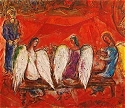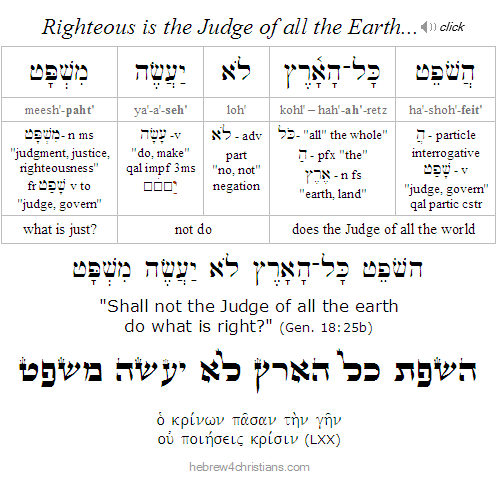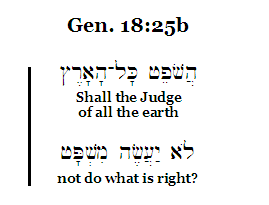|
Our Torah portion this week, parashat Vayera, begins: וַיֵּרָא אֵלָיו יהוה / Vayera elav Adonai: "and the LORD appeared to him (i.e., Abraham) by the oak trees of Mamre, as he sat at the door of his tent in the heat of the day" (Gen 18:1). The midrash Bereshit Rabbah says that the phrase "by the oak trees of Mamre" (בְּאֵלנֵי מַמְרֵא) could be read as "in the oak trees," suggesting that God manifested Himself "as a tree," perhaps to recall Abraham's arrival into the land when he camped before a "teaching tree" (אֵלוֹן מוֹרֶה) in Shechem (see Gen. 12:6).
Rashi says it was the third day after Abraham's brit millah (i.e., circumcision) and God came (in a vision) to inquire as to his friend's welfare (this is regarded as a divine example of bikkur cholim (בִּקּוּר חוֹלִים), "visiting the sick"). During the vision, Abraham suddenly saw "three men" (שְׁלשָׁה אֲנָשִׁים) standing "above him." Who were these strangers? According to the Jewish sages, they were the archangels Michael, Gabriel, and Raphael disguised as Arab wayfarers. Each angel had a distinct mission. Michael came to announce that Sarah would give birth to a son; Raphael came to heal Abraham from his circumcision; and Gabriel came to overthrow Sodom (Bava Metzia 86b).
According to Jewish tradition, when Abraham said, "My Lord (אֲדנָי), if I have found favor in your sight, do not pass by your servant" (Gen. 18:3), he was not speaking to the three visitors (as might be inferred from casual reading of the text) but rather was addressing the LORD Himself. (As a point of Hebrew grammar, Rambam notes that the Hebrew vocalization of the word Adonai (אֲדנָי) with the qamets vowel refers to God; whereas if it's vocalized with a patach (i.e., אֲדנַי) it refers to others, i.e., "sirs.") In other words, when Abraham saw the three strangers, he is said to have interrupted the vision of God and asked permission to take leave of the LORD: "My Lord, if you would, please do not go away from your servant." This interpretation has led to the Talmud's statement that showing hospitality to strangers (i.e., hachnasat orechim / הַכְנָסַת אוֹרְחִים) is more important than even welcoming the Shekhinah (Shabbat 127a). On the other hand, Rashi notes that the literal flow of the narrative suggests that Abraham was addressing the angels by requesting that they (plural) stay. In this case, the verse would be rendered, "My lords (אֲדנָי), if I have found favor in your sight, do not pass by your servant" (Gen. 18:3).
The most accepted Christian interpretation has been that the chief Angel was a pre-incarnate appearance of Yeshua the Messiah (i.e., a "theophany"). Understood in this light, the first verse of the portion, "and the LORD appeared to him" is immediately connected with the vision of the three archangels. In other words, the LORD appeared to Abraham as one of these angels, namely, the Angel of the LORD (מַלְאַךְ יהוה) accompanied with two others (Michael and Gabriel). This explains why it is written that the LORD (יהוה) stayed back with Abraham after the other two angels left for Sodom (Gen. 18:22). (Note that the patriarch Jacob later referred to the LORD (יהוה) as מַּלְאָךְ הַגּאֵל אתִי מִכָּל־רָע / "the Angel who redeemed me from all evil" (Gen. 48:16), just as he earlier had wrestled with a "Man" whom he later identified as God (Gen. 32:30)).
The dialog gets somewhat confusing, however, since it is unclear at times just who is speaking in the narrative. For instance, after graciously providing the three guests with a meal (meat and dairy!), the visitors (plural) asked where Sarah was (וַיּאמְרוּ אֵלָיו / "they asked him..."), but then then the Angel of the LORD said, "I will certainly return to you next year, and your wife Sarah shall have a son" (Gen. 18:10). Most of the Jewish sages (i.e., Rashi, Maimonides, etc.) understand this to be the Shekhinah "Voice of God" that was interjected into the conversation, though the text suggests this came directly from one of the angels, not from a "disembodied Voice" among the oakes of Mamre. At any rate, the purpose of the question was to confirm God's promise (originally given to Abraham in Gen. 17:16) to Sarah herself.... When Sarah heard this, she laughed within herself (lit, "at her insides") and thought, "Now that I am withered, am I to have enjoyment, my husband being so old?" (Gen. 18:12).
When the LORD (יהוה) repeated Sarah's inward thoughts to the others present, however, He omitted some of her words so that Abraham would not feel ashamed: "Why did Sarah laugh, saying, 'Shall I indeed bear a child, now that I am old?' Is anything too wonderful for the LORD?" (Gen. 18:13). The midrash says that the LORD overlooked her reference to Abraham being "too old" for the sake of shalom bayit (family harmony) and to refrain from lashon hara (evil speech). Perhaps some of this exchange was meant to reprove Sarah for disbelieving her husband's faith about a having future son. The sages note that when Abraham first heard the news about an heir "from his own loins," he laughed joyfully, but Sarah later laughed derisively... The Angel continued: "At the appointed time I will return to you (אָשׁוּב אֵלֶיךָ), about this time next year, and Sarah shall have a son" (Gen. 18:14). It should be noted here how the miraculous conception of Yitzchak - the promised "only begotten" son (בֵּן יָחִיד) who was to be sacrificed at Moriah - was meant to foreshadow the miraculous conception of Yeshua and His later sacrifice for our sins....
After reaffirming the promise of the coming heir to Sarah, the angels set out to finish their mission. Abraham escorted them on their way. The chief Angel (i.e., the Angel of the LORD) then rhetorically asked his angelic companions, "Should I hide from Abraham what I am about to do (i.e., go to Sodom), seeing that Abraham shall surely become a great and mighty nation, and all the nations of the earth shall be blessed in him? For I know him (כִּי יְדַעְתִּיו), that he will command his children and his household after him, and they shall keep the way of the LORD (דֶּרֶךְ יהוה), to do charity and justice (לַעֲשׂוֹת צְדָקָה וּמִשְׁפָּט); that the LORD may bring upon Abraham that which he has spoken of him" (Gen. 18:17-19). Note that this is the only place in Torah where the "way of the LORD" (i.e., derekh Adonai) is explicitly defined.
Abraham was destined to be the father of a multitude of nations (אַב־הֲמוֹן גּוֹיִם) - and the land promised to him included the cities of Sodom and Gomorrah and the adjacent plain. Moreover his nephew Lot dwelt in Sodom with his family. The LORD went on to say that "because the outcry against Sodom and Gomorrah is great and their sin is very grave, I will go down to see whether they have done altogether according to the outcry that has come to me. And if not, I will know." The "outcry" has been interpreted to mean the cries caused by violence, and in particular, of the brutal murder of a young girl who dared to help a poor man by giving him bread. According to midrash, it was this girl's cry that "broke through" to heaven and moved the LORD to investigate the matter personally. The LORD's "going down to see" has been interpreted to mean descending from the attribute of mercy to that of judgment. The midrash (citing Ezekiel 16:49) states that the sin of Sodom was primarily because of their pride and their refusal to give charity.
According to midrash, Abraham was perplexed about the generation of the Flood and thought it was impossible that there were not ten or twenty righteous people on the earth at that time. Because of this, he felt compelled to question and to negotiate with the LORD. Would God destroy the righteous along with the wicked? Perhaps Noah thought the decree of the world's destruction was irreversible, but in this case, God told Abraham that His verdict was not sealed, and that emboldened him to intercede on behalf of Sodom. Abraham's chesed (חֶסֶד), his goodness and compassion, prompted him to "draw near" to the LORD as an advocate on behalf of others. Would God's anger cause Him to indiscriminately stamp out the righteous along with the wicked? May it not be so! The wrath of God is the manifestation of His attribute of justice, but what about his attribute of mercy? Surely the Judge of all the earth will do what is right (הֲשֹׁפֵט כָּל־הָאָרֶץ לֹא יַעֲשֶׂה מִשְׁפָּט); surely the reputation of the LORD was at stake!
Abraham began his plea bargaining with 50 righteous (10 for each of the surrounding cities) and went down to 10. Some of the sages say that he did not fulfill his mission since he did not beg that no matter what the circumstance, Sodom should not be destroyed. As it is written in Proverbs: צַדִּיק יְסוֹד עוֹלָם / "The righteous (even one) is an everlasting foundation" (Prov. 10:25). Moses had interceded on behalf of Israel after the sin of the Golden Calf, even asking God to take his life for the sake of God's pardon of his people. Likewise Yeshua went to Cross and died for the sinful and wicked. Abraham appealed to God to spare the righteous. After learning there were none, he no longer negotiated on their behalf.... A midrash, however, states that Abraham did not pray for fewer than 10 righteous men because he believed that if there were less than this, God would destroy the entire world (as He did with Noach and his family, which totaled eight souls). Ultimately, however, God saved Lot and his daughters on the merit of Abraham's intercession ("God remembered Abraham" - Gen. 19:29). In other words, though God might judge the world, He always makes a way of escape for those who are righteous.
Hebrew Lesson
Gen. 18:25b reading (click):
|




